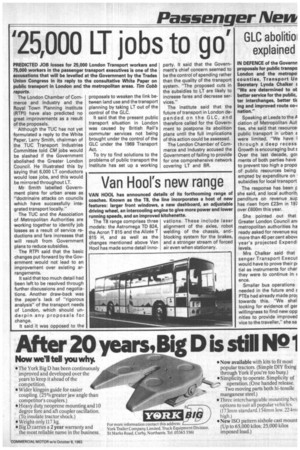'25,000 LT jobs to go
Page 19

If you've noticed an error in this article please click here to report it so we can fix it.
PREDICTED JOB losses for 25,000 London Transport workers and 75,000 workers in the passenger transport executives is one of the accusations that will be levelled at the Government by the Trades Union Congress in its reply to the consultative White Paper on public transport in London and the metropolitan areas. Tim Cobb reports.
The London Chamber of Cornmerce and Industry and the Royal Town Planning Institute (RTPI) have also predicted no great improvements as a result of the proposals.
Although the TUC has not yet formulated a reply to the White Paper, Larry Smith, chairman of the TUC Transport Industries Committee told CM jobs would be slashed if the Government abolished the Greater London Council. He illustrated this by saying that 6,000 LT conductors would lose jobs, and this would be mirrored throughout LT.
Mr Smith labelled Government plans for urban areas as "doctrinaire attacks on councils which have successfully integrated transport locally."
The TUC and the Association of Metropolitan Authorities are working together to identify job losses as a result of service reductions and fare increases that will result from Government plans to reduce subsidies.
The RTPI said that the basic changes put forward by the Government would not lead to an improvement over existing arrangements.
It said that too much detail had been left to be resolved through further discussions and negotiations. Another draw-back was the paper's lack of "rigorous analysis" of the transport needs of London, which should underpin any proposals for change.
It said it was opposed to the proposals to weaken the link between land use and the transport planning by taking LT out of the control of the GLC.
It said that the present public transport situation in London was caused by British Rail's commuter services not being brought under the control of the GLC under the 1969 Transport Act.
To try to find solutions to the problems of public transport the Institute has set up a working party. It said that the Government's chief concern seemed to be the control of spending rather than the quality of the transport system. "The proposed cuts in the subsidies to LT are likely to increase fares and decrease services."
The Institute said that the future of transport in London depended on the GLC, and therefore called for the Government to postpone its abolition plans until the full implications of this action could be assessed.
The London Chamber of Commerce and Industry accused the Government of failing to provide for one comprehensive network covering LT and BR.




































































































